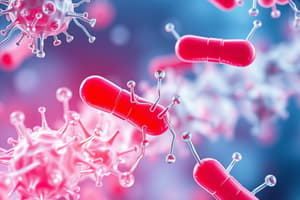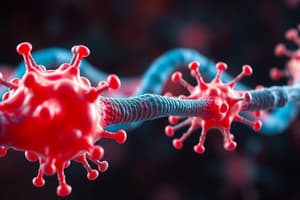Podcast
Questions and Answers
What is pharmacology?
What is pharmacology?
The study of drugs and their effects.
What is pharmacotherapeutics?
What is pharmacotherapeutics?
A branch of pharmacology that uses drugs to treat, prevent, or diagnose disease.
What does pharmacokinetics study?
What does pharmacokinetics study?
The movement of drugs within the body.
What is the definition of a drug?
What is the definition of a drug?
What does biotransformation refer to?
What does biotransformation refer to?
Which category indicates no risk during pregnancy?
Which category indicates no risk during pregnancy?
What is an ideal medication supposed to be?
What is an ideal medication supposed to be?
The rights of medication administration include right patient, right dose, right route, right medication, and right _____.
The rights of medication administration include right patient, right dose, right route, right medication, and right _____.
What are the parts of adverse effects?
What are the parts of adverse effects?
Who is authorized to prescribe medicine under Republic Act 2382?
Who is authorized to prescribe medicine under Republic Act 2382?
Which system is not a common measuring system for drugs?
Which system is not a common measuring system for drugs?
Match the following hypersensitivity reactions with their descriptions:
Match the following hypersensitivity reactions with their descriptions:
Flashcards are hidden until you start studying
Study Notes
Pharmacology Overview
- Study of drugs and their biological effects.
- Involves preparation, uses, effects, and interactions of chemical substances.
Branches of Pharmacology
- Pharmacotherapeutics: Utilization of drugs for treatment, prevention, and diagnosis of diseases.
- Pharmacokinetics: Study of drug absorption, distribution, metabolism, and excretion.
- Pharmacodynamics: Study of the biochemical and physiological effects of drugs and their mechanisms of action.
Drug Classifications
- Excretion Routes: Includes gastrointestinal tract (urine), skin, and respiratory tract.
- Forms of Drugs:
- Oral (ingestion)
- Inhalation (respiratory absorption)
- Topical (skin absorption)
- Parenteral (injectable, 100% absorption)
Drug Properties and Half-Life
- Biotransformation: Conversion of substances into different chemical forms for excretion.
- Half-Life: Time taken for the concentration of the drug to reduce to half, varying with dosage.
Drug Safety in Pregnancy
- Drug Categories:
- Category A: No risk
- Category B: Minimal risk or inconclusive data
- Category C: Identified risks
- Category D: Well-documented risks
- Category X: Contraindicated in pregnancy
Ideal Drug Characteristics
- Should be reversible, predictable, safe (no adverse effects), devoid of interactions, inexpensive, and simple to administer.
Patient Safety Protocols
- Identity verification is crucial.
- Effective communication is vital for patient safety.
- Prevention of falls and careful handling of high alert medications (HAMS) and look-alike sound-alike (LASA) drugs.
Goals in Pharmacology
- Natural Sources: Derived from plants, animals, and inorganic compounds.
- Synthetic Sources: More potent due to enhanced chemical structures.
Drug Evaluation Process
- Preclinical Trials: Testing conducted on animal subjects prior to human trials.
Medication Administration Rights (MS Rights)
- Right patient, dose, route, medication, and time.
Adverse Effects Categories
- Primary Effects: Direct effects of the drug.
- Secondary Effects: Unintended secondary effects vary widely.
- Hypersensitivity Effects: Exaggerated responses to drug administration.
Legal Framework
- Republic Act 2382: Physicians exclusively authorized to prescribe medicines.
- Republic Act 5921 (Pharmacy Law): Only registered pharmacists can dispense medication.
Measuring Systems
- Metric System: Legal standard of measurement.
- Apothecary System: A traditional system based on weight.
- Household System: Common everyday measurements.
- Avoirdupois System: Another weight measurement system.
Nursing Process
- Organizes health information and activities of daily living.
- Lifestyle adjustments, such as prescribed exercise, contribute to patient care.
Types of Hypersensitivity Reactions
- Anaphylactic Reactions: Severe, systemic allergic reactions.
- Cytotoxic Reactions: Target specific cell sites causing damage.
- Serum Sickness Reaction: Immune response leading to tissue damage via blood circulation.
- Delayed Reactions: Longer-term drug allergies manifesting later.
Studying That Suits You
Use AI to generate personalized quizzes and flashcards to suit your learning preferences.




